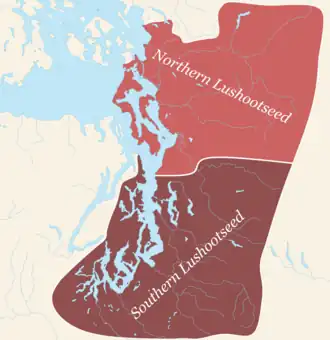List of Lushootseed-speaking peoples
The Lushootseed-speaking peoples, sometimes known as the Lushootseed people,[1][2] are a group of peoples Indigenous to the Pacific Northwest who are linguistically related along the Lushootseed dialect continuum.
Lushootseed-speaking groups were traditionally politically autonomous at the local, or village, level, so there was no historical term to refer to all Lushootseed-speaking peoples.[3] Words like (dxʷ)ləšucid ʔacʔaciɬtalbixʷ or ʔacʔaciɬtalbixʷ kʷi gʷədxʷləšucideb (lit. "Lushootseed peoples" or "Peoples who speak Lushootseed") are sometimes used in modern times.[4]
All historically attested extended village groups or bands are listed, grouped by modern-day tribal units, sub-units, and further sub-units:
Northern Lushootseed
Northern Lushootseed (dxʷləšucid)[5] is spoken by peoples living generally in Island, Skagit, Snohomish, and parts of Whatcom counties. Northern Lushootseed-speaking communities include:
- Upper Skagit – sqaǰətabš[5]
- Sauk – saʔqʷəbixʷ[7]
- Suiattle – suyaƛ̕bixʷ[7]
- Stillaguamish – stuləgʷabš[5]: 230
- Quadsack – qʷacaʔkʷbixʷ
- Swinomish – swədəbš[5]: 246
- Squinamish – sqʷədəbš[5]: 190
- Kikiallus – kikiyalus[5]: 119
- (Lower) Skagit – sqaǰətabš[5]
- Snohomish – sduhubš[5]
Southern Lushootseed
Southern Lushootseed, otherwise known as Twulshootseed (txʷəlšucid)[8] is spoken by the various peoples, historical and contemporary, located in King, Pierce, Thurston, Mason, and Kitsap counties. Southern Lushootseed communities include:
- Skykomish – sq̓ixʷəbš[5]
- Staktalijamish – st̕aq̓taliǰabš[5]
- Upper Skykomish/Index people – bəsx̌əx̌əx̌əlč
- Duwamish – dxʷdəwʔabš[5]
- Suquamish – dxʷsəq̓ʷəbš[9]
- Saktamish – sx̌aq̓tabš
- Puyallup – spuyaləpabš[5]
- Hylebos Creek band – sx̌ax̌ƛ̕abš[10]
- Clarks Creek band – txʷskʷaqʷabš
- Simons Creek band – sqʷədabš
- Homamish – sxʷəbabš[11]
- Shotlemamish – dəxʷsx̌əƛ̕əbabš
- Steilacoom – č̓tilqʷəbabš[5][10]
- Clover Creek band
- Nisqually – dxʷsqʷaliʔabš[5][12]
- Sequalitchew – sčəgʷaličabš
- Lower Nisqually
- Clear Creek band
- Nisqually Lake band
- Muck Creek band
- Meshal/Mashel – bəšalabš[10]
- Squaxin Island – sqʷax̌sədəbš[5][13]
Whulshootseed
Whulshootseed (xʷəlšucid) refers to the large subdialect of Southern Lushootseed spoken by the Snoqualmie and Muckleshoot peoples.
- Snoqualmie – sdukʷalbixʷ[5]
- Muckleshoot – bəqəlšuɬ[5]
See also
References
- ^ Hess, Thom, "Introduction", Lushootseed Reader with Introductory Grammar, vol I.
- ^ Miller, Jay (1997). "Back to Basics: Chiefdoms in Puget Sound". Ethnohistory. 44 (2): 375–387. doi:10.2307/483373. ISSN 0014-1801. JSTOR 483373.
- ^ a b c d e f Collins, June M. (1974). Valley of the Spirits: The Upper Skagit Indians of Western Washington.
- ^ Waterman, T.T. (2001). sdaʔdaʔ gʷəɬ dibəɬ ləšucid ʔacaciɬtalbixʷ – Puget Sound Geographical Names. Seattle: Lushootseed Press.
- ^ a b c d e f g h i j k l m n o p q r s t u v w x y z aa ab ac ad ae af ag ah Bates, Dawn; Hess, Thom; Hilbert, Vi (1994). Lushootseed Dictionary. Seattle: University of Washington Press. ISBN 0-295-97323-4.
- ^ Richardson, Allan; Galloway, Brent (2011). Nooksack Place Names: Geography, Culture, and Language. Vancouver: UBC Press.
- ^ a b "Sauk-Suiattle – Index". sauk-suiattle.com. Retrieved September 24, 2023.
- ^ "Puyallup Tribal Language – Home". www.puyalluptriballanguage.org. Retrieved September 24, 2023.
- ^ "The Suquamish Tribe – Home of the Suquamish People". Retrieved September 24, 2023.
- ^ a b c Smith, Marian W. (1941). "The Coast Salish of Puget Sound". American Anthropologist. 43 (2): 197–211. doi:10.1525/aa.1941.43.2.02a00050. JSTOR 662952.
- ^ Hutchinson, Chase (March 1, 2021). "Estuary has new name, honoring tribe; you'll need to watch a video to pronounce it". The News Tribune. Retrieved September 24, 2023.
- ^ ":: Nisqually Indian Tribe Home Page". www.nisqually-nsn.gov. Retrieved September 24, 2023.
- ^ a b c d e f "Who We Are – Squaxin Island Tribe". Retrieved September 24, 2023.
- ^ a b c Tollefson, Kenneth D. (1987). "The Snoqualmie: A Puget Sound Chiefdom". Ethnology. 26 (2): 124. doi:10.2307/3773450. JSTOR 3773450.
